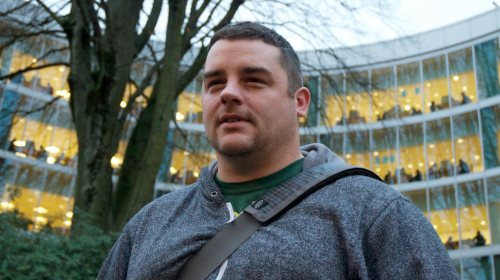
(Rick Stoller, who directs the Harbor Lights shelter, says it’s becoming increasingly difficult to find appropriate affordable housing for veterans.)
Shock Waves from the May 29 edition of Street Roots
It’s a warm, still May afternoon as people mill around the curb outside a downtown shelter, and Tyrone Brown, a fiery Vietnam veteran with a baseball cap and greying goatee, is pissed off.
“We got this country free,” he says, gesturing toward other veterans who are staying in the Glisan Street Shelter or, like him, waiting for a space in it. “What are we doing being homeless?”
Veterans have long been a large segment of the U.S. homeless population. There are no perfect estimates of how many veterans are on the streets, but by several accounts, the number is on the rise — especially for older veterans like Brown.
The Department of Veteran’s Affairs estimates that there are 2,042 veterans experiencing homelessness on any given night in the Portland service area, which includes Vancouver. That’s up from 1,790 in 2006.
Portland’s One Night Street Count, which surveys people who were homeless on a given night in January, found 192 veterans this year compared with 108 in 2007. The jump far outpaces the increase in the overall street count, which only grew by about 10 percent.
Though some of those new to the streets are younger veterans recently returned from Iraq or Afghanistan, the vast majority are 45 and older. Roughly a quarter said they’d been homeless for less than one year. Older veterans were becoming new to the streets.
John Means of Central City Concern’s Homeless Veterans Reintegration Project says their employment program is seeing more and more clients who are new to the streets. Two years ago, Means says, most of their clients were veterans considered chronically homeless, and they’d see the same people come back multiple times.
“Over the last year, maybe year and a half, newer people have come in,” Means says. “Now we’re getting a lot of people (who are) six months, seven months, eight months homeless.”
For Larry, a 48-year-old Marine Corps veteran who didn’t want his last name used, construction work dried up. Then he was laid off from a factory job. He recently found work picking up trash at the waterfront for the Rose Festival, but he was fired when his employer ran a background check and found a 20-year-old felony assault conviction.
“Evidently there’s a problem picking up trash at the Rose Festival for felons,” Larry said. “It’s never gotten in my way at all, but now with the economy the way it is, people are pickier.” Continue reading →
 He had joined the Marine Corps in mid-2001 and was in boot camp on 9/11. Trained as a combat engineer, he deployed to Kuwait in 2003 and his unit was among those to breach the Iraqi border for the invasion forces that March. Continue reading
He had joined the Marine Corps in mid-2001 and was in boot camp on 9/11. Trained as a combat engineer, he deployed to Kuwait in 2003 and his unit was among those to breach the Iraqi border for the invasion forces that March. Continue reading 







